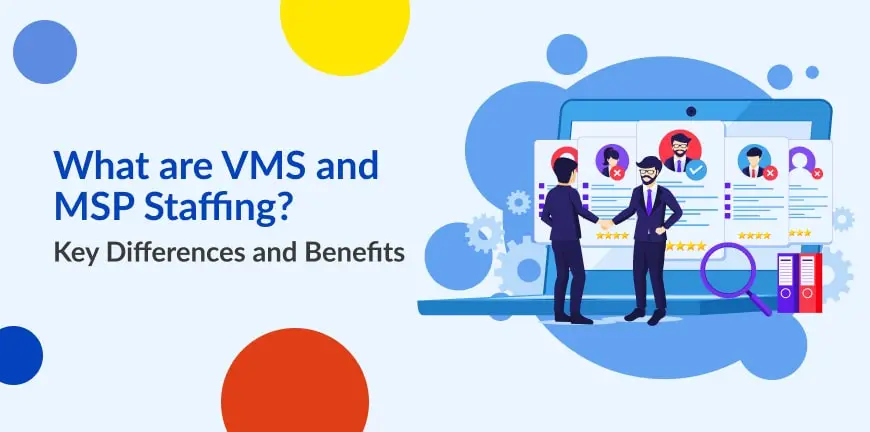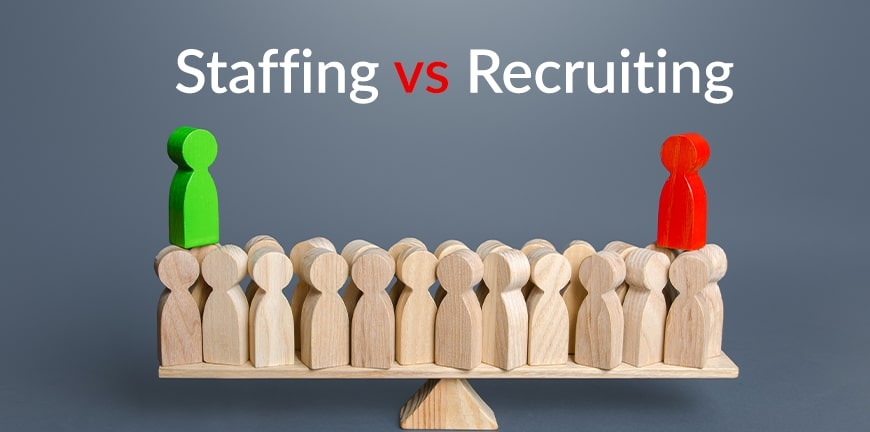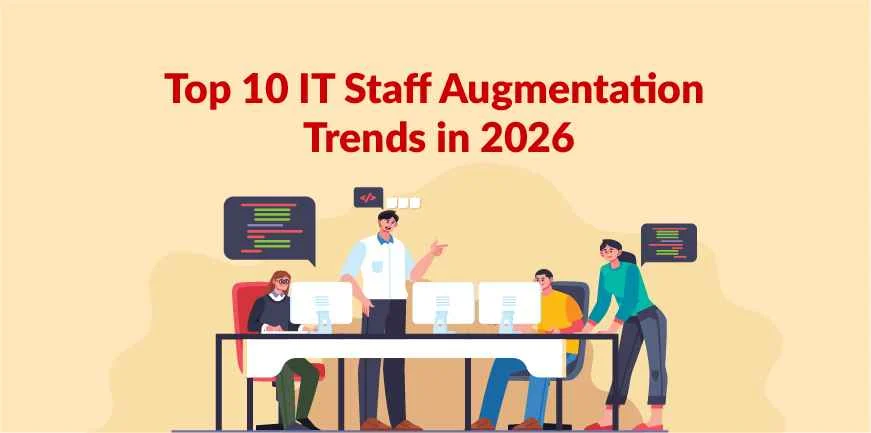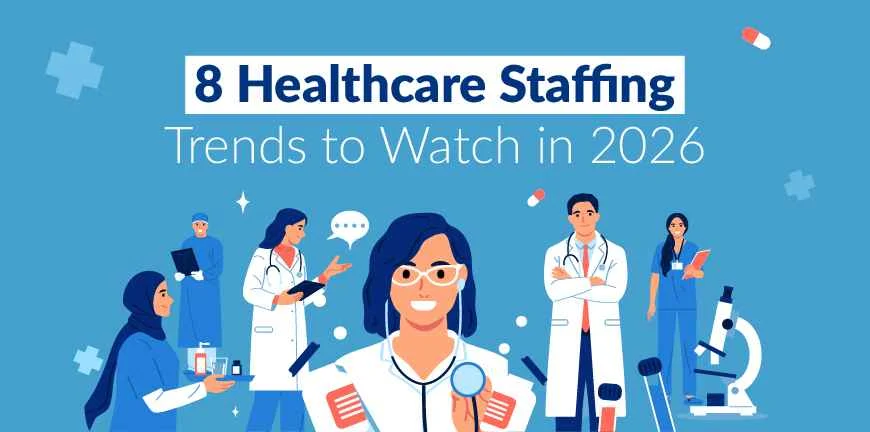
What Is a Compliance Audit? Comprehensive Guide in 2026
02/04/2025
What is Legal Recruitment? Benefits, Process & Key Challenges
07/04/2025- What is MSP?
- What is VMS?
- What is the difference between a VMS and MSP?
- How do VMS and MSP help the client and the recruitment process?
- What are the Benefits of Combining MSP with VMS?
- What is the Relevance of MSPs and VMS in the upcoming years?
- Are You Looking for a Reliable Staffing Partner?
- Frequently Asked Questions (FAQs)
Think of MSPs or Managed Service Providers as your gurus managing your workforce. They have expertise in streamlining and handling your contingent workforce, managing everything from identifying candidates to onboarding and driving the contract work activities smoothly. Meanwhile, a Vendor Management System (VMS) is like your tech-activated assistant, making recruitment seamless, smart and easy by automating it. VMS vs MSP in staffing are the power players in the staffing world and are here to stay.
What is MSP?
MSPs also referred to as Managed Service Providers are a third-party agency and take on the responsibility of handling the contingent workforce of a client or organization from sourcing to onboarding leveraging technology platforms.
What is VMS?
The Vendor Management System or VMS is a software solution provided to MSPs in staffing to streamline recruitment processes from sourcing to onboarding to managing relationships with agencies. The system enables organizations to improve efficiency, enhance cost saving and gain visibility.
What is the difference between a VMS and MSP?
MSP vs VMS key differences are as follows:
1. MSP
A Managed Service Provider or MSP plays the role of a strategic partner for organizations, offering extensive management of their contingent workforce. The approach that they take towards managing the entire recruitment process is holistic. They keep the ball rolling by monitoring the entire screening to onboarding to compliance management. They work with HR teams managers, and staffing suppliers to ensure smooth operations.
Another important role of MSPs is maintaining relationships with a network of staffing suppliers. They are responsible for negotiating contracts, managing performance, and ensuring compliance with regulations. MSPs are proficient in streamlining the procurement process and enhancing efficiency.
2. VMS
VMS is essentially technology-driven and focuses on automating and streamlining recruitment workflows through a software platform. It helps organizations manage procedures like interview process, job requisitions hiring decisions in a centralized system.
VMS enables organizations to get visibility into supplier performance, candidate quality, and more. It initiates reports and analytics enabling organizations to make data-driven decisions, optimize sourcing strategies, and enhance the overall recruitment process.
How do VMS and MSP help the client and the recruitment process?
VMS and MSPs are game changers in the staffing industry and the dynamic duo helps organizations and clients streamline the hiring procedure resulting in cost efficiency, increased efficiency, and enhanced visibility for clients. They are also beneficial to staffing agencies as they offer a centralized platform and expert guidance.
VMS and MSP solutions expedite administrative tasks by automating them. They are responsible for onboarding, time tracking, and reporting, making client resources available for other priorities. For staffing agencies, MSPs tackle the comprehensive contingent workforce lifecycle enabling staffing agencies to focus on their core capabilities.
With the help of VMS data and analytics, staffing agencies can obtain valuable insights into their performance and identify areas for improvement. Yet another advantage is that VMS enhances collaboration between clients, MSPs, and staffing agencies, transforming the recruitment process into an efficient and effective activity.
What are the Benefits of Combining MSP with VMS?
MSP and VMS are both uber-powerful tools and are revolutionizing the staffing industry. Together they can create magic. Let us see the benefits of combining the two:
1. Enhanced Visibility
As the data in a VMS is centralized an organization can make data-driven decisions and gain valuable insights into the contingent workforce, performance, optimization and talent utilization. VMS technology enables us to make the recruitment system transparent starting from sourcing to onboarding and offboarding.
Management efficiency can be implemented with the expertise of MSPs, and the technological prowess of VMS and an improved oversight of the workforce can be provided fostering efficient management and compliance.
2. Cost Optimization
Leveraging MSP expertise and VMS technology enables organizations to optimize the cost of their contingent workforce. The optimization is attained with better negotiation, vendor management, and transparent and streamlined processes.
MSPs can manage the complex structure of contingent workforce management, making the internal resources available helping firms to focus on their core operations.
3. Talent Management
The combination of MSPs and VMS drives firms to leverage their network and experience to access a broader talent pool compared to traditional staffing agencies, ensuring they get connected to highly skilled candidates of top quality. The powerpack duo with their expertise and technology combination of MSP expertise and VMS technology drives proactive workforce planning.
4. Smooth Workflow
An organization experiences an improved outcome when VMS makes communication and collaboration seamless between MSPs, vendors, and internal teams, leading to a flawless workflow. The workflow also becomes easy and efficient when firms outsource contingent workforce management and can focus on their core competencies and strategic initiatives.
What is the Relevance of MSPs and VMS in the upcoming years?
Managed Service Providers (MSPs) and Vendor Management Systems (VMS) are expected to play vital roles in the ever-changing business landscape even in the coming years, Factors and trends like technology, and business operations will make them relevant and make them help in shaping workforce management. Let us see how they are important:
1. Remote and Hybrid
Remote and hybrid work models have been an integral norm of organizations, and they have become more reliant on MSPs to tackle the complexities of IT infrastructure, cybersecurity, and remote operations. MSPs are likely to be in demand as companies are looking for experts to handle these systems while they maintain productivity, security, and compliance.
2. Cybersecurity Concerns
With cyber threats becoming a big concern, MSPs are intrinsic to organizations for providing improved cybersecurity services. There is a chance that organizations will be increasingly reliant on MSPs as they might continue to face the risk of cyberattacks. As businesses shift to more digital and cloud-based environments, the role of MSPs in cybersecurity will grow.
3. Automation and AI
MSPs will spearhead the integration of AI and automation technologies into organizations’ workflows. Automation enhances business efficiency by streamlining processes, optimizing data analysis, and reducing human error. MSPs can help organizations by providing them with advanced technological solutions enabling them to implement them effectively while minimizing risks.
4. Cost Management
In this world of competition and increasing costs, businesses are looking for ways to cut costs while scaling operations. MSPs and VMSs can play an integral role in managing and optimizing costs. An organization will have fewer requirements for in-house IT departments if MSPs are managing the workflow ensuring services are delivered at a lower cost. VMS solutions help businesses optimize vendor selection ensuring that external services used are cost-effective.
Are You Looking for a Reliable Staffing Partner?
If you are in search of a reliable staffing partner, it is significant that you find a partner whose services will align with your specific business needs. We at Alp Consulting can offer you services as we have the expertise and industry knowledge to help you with placing talents in suitable roles.
We understand that a candidate should not only have to be technically fit but should also culturally align with your business. We are a reliable staffing partner who will offer you a large and diverse talent pool entailing a mix of full-time, part-time, temporary, and contract workers. We will tap into niche skill sets as required.
Frequently Asked Questions (FAQs)
1. What is MSP and VMS in IT Staffing?
In IT staffing, MSP or Managed Service Provider is an external company that manages a business’s contingent workforce, while VMS or Vendor Management System is a technology platform enabling automation and streamlining the process of managing vendors and the contingent workforce.
2. What are MSP staffing Models?
MSP staffing models involve outsourcing the management of an organization’s contingent workforce to a third-party provider. The models entail outsourcing, end-to-end management, a vendor-neutral approach and a focus on core business.
3. What is MSP’s full form in staffing?
In the staffing context, an MSP is also called a Managed Service Provider as it is a third-party outsourced by companies to manage their contingent entailing recruitment, management, and vendor relationships.
4. What is VMS’s full form in staffing?
In the staffing context, VMS is also known as Vendor Management System, a software platform that helps businesses manage their relationships with external suppliers or vendors, specifically for contingent labor.
5. What are the challenges of implementing an MSP program?
Implementing a Managed Service Program (MSP) can sometimes be challenging as it might present difficulties like planning and governance, stakeholder buy-in, integration with existing systems, ensuring compliance with regulations, cyber security threats, cost issues and many more.
6. What are Common Pricing Models for MSP and VMS Staffing?
A few of the common pricing models of MSP are Per-Device Pricing, Per-User Pricing, Tiered Pricing, Value-Based Pricing (Flat-Fee), A La Carte Pricing and Monitoring-Only Pricing. VMS staffing pricing models entail a Percentage of Spend Under Management and Supplier-Funded vs. Client-Funded.
7. How does an MSP Compare to in-house Staffing management?
MSPs manage the entire contingent workforce entailing talent acquisition, vendor management and workforce optimization while in-house staffing management manages the workflow internally sometimes failing to execute a recruitment process on a large scale.
Contact Us For Business Enquiry

Kasthuri R
Kasthuri R is the Co-Founder & Executive Director at ALP Consulting, bringing over 23 years of experience in search, staffing, and HR consulting. She has been instrumental in driving ALP’s recruitment, employee leasing, and executive search practices across diverse industry verticals. With deep expertise in talent acquisition, HR strategy, and operational management, Kasthuri has built scalable, client-focused solutions that enhance workforce efficiency. Her strategic leadership continues to steer ALP Consulting toward innovation and excellence in people management.




